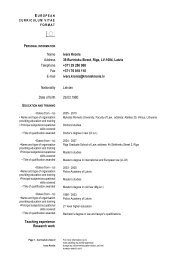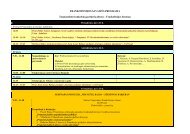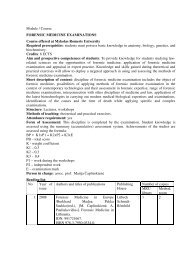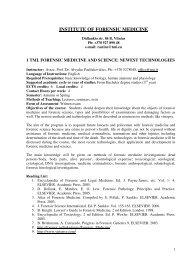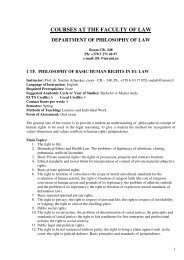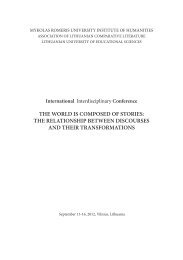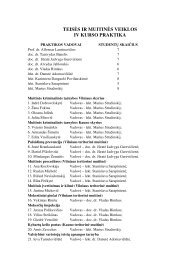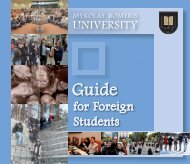Name of Lecturer: Prof. dr. Saulius Arlauskas tfk@mruni.lt
Name of Lecturer: Prof. dr. Saulius Arlauskas tfk@mruni.lt
Name of Lecturer: Prof. dr. Saulius Arlauskas tfk@mruni.lt
Create successful ePaper yourself
Turn your PDF publications into a flip-book with our unique Google optimized e-Paper software.
International Cooperation and Protection <strong>of</strong><br />
Rights in Criminal Proceedings<br />
<strong>Name</strong> <strong>of</strong> <strong>Lecturer</strong>: Assoc. pr<strong>of</strong>. <strong>dr</strong>. Raimundas Jurka, Ph.: +370 5 271 46 39,<br />
rjurka@mruni.eu;<br />
Facu<strong>lt</strong>y: Facu<strong>lt</strong>y <strong>of</strong> Law<br />
Department, Contact Details: Department <strong>of</strong> Criminal Procedure<br />
Language <strong>of</strong> instruction: English<br />
Level <strong>of</strong> Course Unit: Bachelor<br />
Year <strong>of</strong> Study (if applicable): 2-4 years <strong>of</strong> study<br />
Required prerequisites: Legal Theory, Criminal Law, Constitutional Law,<br />
Introduction to International Law, Introduction to EU Law<br />
Learning Outcomes <strong>of</strong> the Course Unit 1 . A student will know/will be able: a) to<br />
make analysis on the issues <strong>of</strong> international legal cooperation in criminal matters; b)<br />
to deepen into the preconditions <strong>of</strong> mutual cooperation in fighting organized crime; c)<br />
to discover weather the human rights are properly implemented while the cooperation<br />
in criminal matters is carried on; d) to find out, what are the main signals for violating<br />
human rights, that are established in the Convention for Human Rights Protection.<br />
ECTS credits: 6<br />
Contact hours per week: 3<br />
Semester: Autumn<br />
Planned Learning Activities and Teaching Methods: classes and individual<br />
tutoring, discussing practical situations<br />
Assessment methods and Criteria: oral examination and tests<br />
Course content: (up to 10 sentences)<br />
The course matter focuses on the factual and legal grounds <strong>of</strong> protection <strong>of</strong> rights in<br />
criminal proceedings. Constitutional and other procedural rights and interests <strong>of</strong> the<br />
participant <strong>of</strong> criminal proceedings are taken into consideration as well. One <strong>of</strong> the<br />
point to this course, that should be taken into account is the domestic and international<br />
(as well as European Union level) legal instruments that help for ensuring the<br />
protection <strong>of</strong> the participants’ and other persons’ legal stand in criminal procedure.<br />
Reading list: (maximum 5 items)<br />
1. Suspects in Europe. Procedural Righst at the Investigative Stage <strong>of</strong> the<br />
Criminal Process in the European Union by E. cape, J. Hodgson, T. Prakken,<br />
T. Spronken. Antwerpen: Intersentia, 2007.<br />
2. Jurka R., Juzukonis S. Criminal Procedure System <strong>of</strong> the Republic <strong>of</strong><br />
Lithuania // Transition <strong>of</strong> Criminal Procedure Systems / edited by Berislav<br />
Pavisic. Vol. II. Rijeka, 2004.<br />
3. An Introduction to International Criminal law and Criminal Procedure / by R.<br />
Cryer [et al.]. Cambridge: Cambridge University Press, 2007.<br />
4. Principles <strong>of</strong> Criminal Procedure / by R. L. Weaver [et al.]. St. Paul: West<br />
Group, 2004.<br />
5. Human rights in criminal proceedings / by S. Trechsel. Oxford: Oxford<br />
University Press, 2005.<br />
1 Knowledge, skills, competences that students can demonstrate/acquires during the course<br />
16



